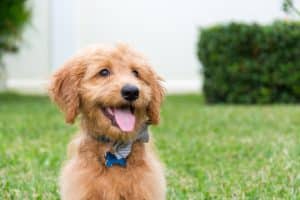The Proud and Loyal Cane Corso: Understanding Their Personality
The Cane Corso, a descendant of ancient Roman war dogs, is a magnificent breed known for strength, loyalty, and a noble presence. Here’s a deep dive into their temperament and training needs:
Characteristics of the Cane Corso
- Physical Build: Powerful and muscular, with a large head, strong limbs, and a short, shiny coat. Can come in black, gray, red, or brindle.
- Size: Large. Males stand 24-28 inches at the shoulder and weigh 99-110 pounds. Females are slightly smaller.
- Lifespan: 9-12 years
Temperament and Personality
- Activity Level: Moderate to high-energy. Cane Corsos need ample exercise and mental stimulation to prevent boredom and destructive behaviors.
- Trainability: Intelligent, but can be independent. Consistent, positive reinforcement-based training is crucial.
- Aggression: Not inherently aggressive. However, proper socialization and training are essential for a well-adjusted, non-aggressive Cane Corso.
- Eating Habits: Prone to bloat. Multiple smaller meals throughout the day are recommended rather than one large meal.
- Loneliness: Doesn’t tolerate prolonged solitude well. They thrive on companionship and attention.
- Barking Tendency: Loud and deep bark for protection purposes. Training can help manage barking.
- Grooming: Low maintenance, sheds moderately year-round. Requires regular brushing.
Behavioral Traits
- History as Working Dogs: Cane Corsos are serious and focused, but also affectionate and loyal.
- Sensitivity: Requires gentle, positive training methods. Harsh treatment can lead to fear or aggression.
- Guarding Instincts: Protective of their family. Early socialization is critical for appropriate behavior around strangers, children, and other animals.
Training Your Cane Corso
- Start Early: Begin training and socialization from puppyhood for an obedient, confident dog.
- Independent Streak: Be patient and firm with their independence. Positive reinforcement is key.
- Begin with Basics: Focus on toilet training, leash walking, simple commands, and preventing unwanted behaviors like biting or barking.
- Mental & Physical Stimulation: Provide ample exercise and activities to prevent boredom and channel their energy constructively.
- Professional Assistance: Consider seeking help from a qualified trainer with experience in working breeds.
Key Takeaways
- Cane Corsos are devoted and intelligent companions, but require responsible ownership.
- Proper socialization from a young age is paramount for a well-adjusted dog.
- Consistent training with positive reinforcement is essential for success.
- Cane Corsos require both exercise and mental stimulation to thrive.
If you’re a dedicated dog owner with experience handling large, powerful breeds, a well-trained Cane Corso can be an exceptional companion and protector. Invest in their training and socialization, and you will be rewarded with a magnificent and loyal friend for life.
Contents
Cane Corso Traits
When it comes to describing Cane Corso or Italian Mastiff large dog breeds we must say that they are well-built animals. The dog harmoniously combines power and elegance as they were Roman War dogs. The Cane Corso Italiano dog has an athletic body structure as per the National Breed Club. The animal has well-defined relief muscles. The dog has strong, slender limbs and needs obedience training from an early age.
The Cane Corso is a dog with an arched, large head and a slightly upturned muzzle. The skull of the adult dog is wide. The animal has an oval shape, medium size, straight-set eyes, and an attentive and penetrating look.
The ears of the dog are hanging, triangular, and close fitting to the head, and the neck is strong and muscular. The tail of a domestic animal is thick at the base. The dog’s nose is black. He is large, nostrils are wide open.
The Cane Corso has a short and shiny coat. The coat of a four-legged friend is characterized by density, the undercoat is weakly expressed. In Cane Corso, the coat color can be different, for example, black or gray, red (light or dark), or brindle (there are dogs with stripes of various tones on a red, or gray background).
The height of males at the withers (height) ranges from sixty-four to sixty-eight centimeters, and females – from sixty to sixty-four centimeters. In a Cane Corso dog, the weight is from forty-five to fifty kilograms, and in females – from forty to forty-five kilograms and the Cane Corso lifespan is just 9–12 years.
According to American Kennel Club (AKC), Cane Corso’s personality may get aggressive if you leave a bored Cane Corso puppy alone at home.
With early socialization as well as the right puppy training classes, care, mental, and physical stimulation,corsos can do well around other animals, and strangers, and also calm children.
Cane Corso Temperament and Personality Traits
Here are the personality and temperament traits of Cane Corso puppy and adult dogs. Let’s have a look at the personality and temperament traits below:
Activity
Despite the impressive Cane Corso’s size and imposing manners, Cane Corso loves to walk and play with the owner. You need to devote at least 2 hours daily to activities. So, get a Cane Corso dog if you are one of the experienced pet parents who can offer proper exercise. Cane Corsos need a lot of physical activity daily to maintain a healthy weight.
Susceptibility to training
A typical character trait of the Cane Corso is independence, which can complicate the process of learning commands. So, training Cane Corsi dogsbecome easier than training another dog breed.
Aggression
Not breed specific. However, the temperament of Cane Corso dogs largely relies on the training and care they receive from the owner. These dogs are generally confident and assertive. They must be affectionate and gentle family members if trained properly, but in case left with an unskillful owner, then the Cane Corso dog breed can become very aggressive.
Eating habits
As with all large dogs, lean meats are recommended. You can also give safe dog food to your Mastiff breeds. Since the Cane Corso dog breed is susceptible to GDV and bloat, pet parents should take some protection when feeding the Cane Corso puppy. Always feed your Italian Cane Corso more smallish meals all day (rather than 1 big meal).
Attitude toward loneliness
Prolonged loneliness is not well tolerated. They should not be left alone for long periods to avoid damage to furniture or loud barking. So, indeed the Mastiff breed is affectionate, but they need constant attention from the owner.
Tendency to bark
Like other large guard dogs, it has developed vocal cords. The barking is loud, and the tendency to it is corrected by training. This trait makes this dog a perfect bodyguard-dog or guard dog.
Need for communication
They are very friendly, do not tolerate a long separation from the owner, and love attention.
The need for careful grooming
The coat of the Cane Corso, when properly cared for, is practically odorless. The dog sheds all year round and needs regular brushing to remove dead hair.
Behavior Of Cane Corso Breed
Cane Corso dogs have a long history of being working dogs and can be serious and sensitive. Their behavior is greatly influenced by the nurturing and instruction they get as children. In the right hands, they may be loving and compassionate, but in case the dog parent is inept or cruel, the Cane Corso may react.
Always supervise the Cane Corso when it interacts with kids or other animals, and teach kids how to behave around dogs. Corsi prefers to be near their family, preferably in the same space. Place dog kennels in the areas of the house where you devote the most time.
Cane Corso Training Guide
Raising a puppy should begin immediately after he gets comfortable in a new home. The sooner you start training, the easier and more fruitful it will be in the future. Do not forget that the breed is independent.
But it is precisely this quality that can become an obstacle in education: Cane Corso can think negatively about commands or try to act on their own. If this behavior of the puppy is not corrected from an early age, in the future it can become a cause of disobedience and stubbornness.
Education should begin with habitual actions, for example, toilet training. The puppy needs to be taught to go to the toilet on a special diaper until he is allowed to go outside. It is not worth punishing too much for “mistakes”, but you can’t leave them unattended either – the puppy must know where and what to do.
The same goes for some prohibitions, such as begging for food, sleeping in the master’s bed, jumping on people and biting (even when playing), barking, and howling. Fighting such habits with age will be more difficult if you do not wean them immediately.
Before you take your puppy for a walk, you need to teach him to wear a collar and walk on a leash. First, you can put the collar on for a while and reward the dog if he does not try to take it off. You can also lead a puppy on a leash around a room or apartment for some time to get used to it. In addition, before going outside, you should teach the dog the “Next!” command. , as well as “No!” and “To me!”.
When the puppy can walk, it is necessary to continue training on the street, devoting at least half an hour to this in the morning and evening. All workouts are best done on an empty stomach. If the pet eats, he will not have an additional motivation to follow commands, and rewards in the form of treats will speed up their execution and memorization.
It is best to do it without the presence of strangers, so as not to distract the dog. So for outdoor activities, it is better to choose sparsely populated places. Remember that a Cane Corso will only follow the commands of a stranger. Therefore, if you turn to a cynologist for help in training, it is important that he does not train the dog himself, but teaches you.
FINAL WORDS
Cane Corso is unusually gentle and affectionate with “their” owners. The word of the owners for them is the law. This makes the representatives of the breed excellent nannies and companions for children’s games. Giants adore children and tolerate any of their pranks and pranks.
At the same time, do not forget that you are dealing with a huge dog, and it can, not wanting anything bad, accidentally hurt your baby.
The average Cane Corso cost from a reputed breeder is approximately $1,500–$2,500. Nevertheless, for a Cane Corso pup with a superior pedigree and top breed lines, the price may be around $3,000 to $5,500.







